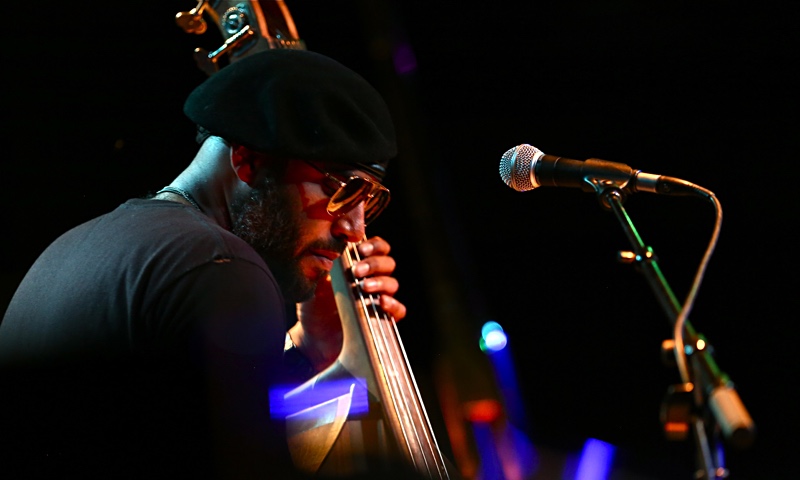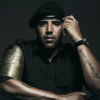Home » Jazz Articles » Interview » Miles Mosley Gets Down!
Miles Mosley Gets Down!

All About Jazz: Let's start with your latest release, Uprising, a beautiful album which bursts with energy. It showcases the West Coast Get Down in top form and featuring your long time collaborators and friends Kamasi Washington and Tony Austin. What is the concept behind Uprising?
Miles Mosley: I wanted to make a record that addresses common human emotions. You know, it's difficult to be emotionally in this world and survive all its upsides and downsides, the good and the bad. Sometimes we can use music as a way to find a sense of peace or a sense of reasoning and so I began writing songs that made me feel better or made me feel, you know, like i had some sort of support, emotionally.
AAJ: Your music carreer is very eclectic: you studied Jazz with Ray Brown and John Clayton, you are a member of music collectives like the West Coast Get Down and The Next Step, you work with Lauryn Hill, Kendrick Lamar and Common and you play with Kenny Loggins (on Thundercat's Drunk in "Show Me the Way"). At the same time you've played with Jonathan Davis and with Chris Cornell. What is the secret of your versatility?
MM: Well, I think that I've been fortunate enough to work with a wide a variety of artists from different genres because I have a lot of respect for every genre of music. I don't put blinders on. I don't believe that one is better than the other. Each genre is important and has amazing musicians inside of it and if you take time to study it you can develop a style, a universal style, and make great music. So I've been able to work with great artists across all kinds of genres, in different intensities. The way I play my instrument is equally versatile, it can be very natural and "wooden" and it can also be "Jimi Hendrix Style," very aggressive. For Jonathan Davis and the likes that is perfect because those guys pitch their guitars way down, to B sometimes, and so for him it was really natural to have this aggressive bass sound. Plus, when I use the bow I can emulate the sound of moog synthezisers. I really appreciate working with him and with Chris Cornell too. I'm very fortunate.
AAJ: Let's talk about the West Coast Get Down collective. When did you have the idea of putting these artists together?
MM: Well, we all grew up together in Los Angeles and we know each other since, at least, high school. We've all been around each other and learned music together. We grew up in L.A. at a time when our Government was putting a lot of money into music programme, so we're very fortunate to have had great teachers, great programmes thanks to which we were able to excel in music with a lot of support from our Country. Everybody has grown up, finished college or skipped college to begin gigging with other people and we're always on tour as sidemen for the likes of Jonathan Davis, Chaka Khan, Babyface etc. But when I used to come back from those tours there was no place in L.A. for us to come and be ourselves, to play our music. So I decided to start a residency where we would play twice a week. Anytime the guys were in town I would tell them to come down to this spot in Hollywood and play, bring new music. Doesn't matter how long we play, in that place we can do whatever we want. We have total freedom. At some point, while we were doing a show I called them The West Coast Get Down... "Ladies & Gentlemen: Welcome to The West Coast Get Down." We realized that we had a lot of music that we had written, that we liked, that the audience liked. It was time to invest in ourselves, so we went in a studio for thirty days and we recorded 170 songs. This is how fabled West Coast Get Down began. The Epic came out of those sessions. We got our chance, we got our opportunity. There was no strategy behind us, it was just what life had given us, a fortunate series of circumstances in which a group of guys that grow up together and share brotherhood, work together. It was logical for us to play together and help each other finishing our album.
AAJ: The Uprising recording sessions lasted very long and overlapped with those for The Epic, Kamasi's opus album released two years ago. It must have been a really demanding time for you and your musicians. Are there any anecdotes from those sessions you'd like to share?
MM: We were not working on those two albums only. We were working on everybody's albums: on Cameron [Grave]'s album, Tony [Austin]'s album, Ryan [Porter]'s, Kamasi's... I am a really organized person, I'm some kind of project leader and so what I did was to draw up a big scheme on the wall and I divided each in day in three hour segments so everybody got three hour a day to work on their album. So, every single day, we were working on three different albums. This approach turned out to be beneficial to all of us, because when it's your turn you have all the pressure of the session on you but then, after three hours of intensity, it's someone else's turn and you can relax your brain and focus on helping them to get their vision out and just be a bassist or a pianist. and the next day it start all over again. It was very intense but we had a goal, we had a drive, we had a vision and we had a lot of luck. We worked hard every single day to 10 am to 2 am, but you know, we're like a family: we laugh, we hang out... and we worked hard!
AAJ: The media does not pay due attention to your singing and focuses mostly on your role as a bassist. Uprising shows you can sing, and you do it very well. Was it natural for you to be behind a microphone? Did you have the feeling that you were the best suited to sing those lyrics or was it out of necessity?
MM: I came from singer-songwriter studies. I've always had a massive amount of respect for the power of words and the crafting of lyrics and how powerful songs are. So, I've always written lyrics as I was learning play bass and I always have a notebook and a pen with me to write songs, but I wouldn't sing them. When I was in my 20's I started singing songs because I was working in a mental therapy group program with kids that couldn't express themselves very well so they hired me to write songs with them and through the writing of songs they would be able to express their emotions, their fears, their councerns. The goal was to help them to get mentally stronger. At the end of each session I sang their songs for the class and so I started realizing how songs can making people feel better and so through that I got the bug and I felt like I wanted to get better at songwriting. Also, you know, being a bassist singing songs made my music more accessible and people paid more attention to the song and would stick around when the time for the bass solo came. It's kind of a nice combination. In order to deliver what I wanted, I felt that my voice would be good because I think I have a very natural sounding voice... It's very conversational!
AAJ: There's so much Funk, Soul and Fusion in Uprising. What did you grow up listening to and what was the record that made you realize "When I grow up I'll be a musician!"
MM: It's quite simple, I remember the first time I heard the Oscar Peterson Trio with Ray Brown playing bass. Right then I realized the importance and the accuracy of the bass in that trio. It was something that hit me and I felt like "Wow there's an instrument there that is the center of everything but is not hugging the spotlight." As a kid I was really into grunge, bands like The Lemonheads, Dinosaur Jr. I got heavily into that scene. At the same time my parents always listened to Motown albums, The Tempations, Marvin Gaye, Ray Charles too... When you put this combination of jazz, grunge and soul together you can understand why my bass sounds like the way it does. Honestly, the eighties and nineties in L.A. were the pinnacle of gangsta rap, and that had a huge importance on me too. These are the most important influences on my music.
AAJ: It is always difficult for a musician to choose the favorite among his own compositions. If you were forced to make this choice, what would be the important and significant song on Uprising?
MM: I think "More Than This" is one of my favorite songs because I think it really describes how all of us felt growing up in Los Angeles, growing up in a world that is contantly changing, always shifting the finishing line. You know, when I was growing up and learning how to play there was a very straight line to the top of the mountain: it was "practice very hard, work hard and if you get good enough you can have a carreer, be able to buy an house, pay your rent, be confortable just practicing hard." As time changed it turned out that that wasn't enough, actually wasn't just practing hard, do what you love and you'll be fine... It's about making, for me and for us, music that makes people feel supported and that's the most important thing. And the rest is just... business.
AAJ: What do you think will be the next challenges for you and the musicians of the West Coast Get Down, now that you have taken the music world by storm?
MM: We have a lot of music left to put out, we have a lot of music and ideas and that we want to accomplish. As for me, I'm just excited to begin a travel around the world and share this album with people. After all this is the main goal of our job: sharing music with people. I think we have a lot of great records to come and I think it will be interesting for the audience to see how diverse not only each member of the West Coast Get Down is from another, but how diverse we are with the music that we make for ourselves. The next album that I will put out may not sounds exactly like Uprising. Maybe the other piece of me, that I really like, that one with more grunge influence will came out, or maybe that one more classical... If the audience will be open enough to us I think they will have years and years of great music ahead.
AAJ: What are the most important albums that have changed your life as a man and as a musician?
MM: For me, without any doubt, We Get Requests by the Oscar Peterson Trio. That album defined my thoughts about upright bass. Also "Hard Times" by Ray Charles (it's hard to pick one Ray Charles' album!) and Up by Peter Gabriel (Tony Levin is one of my heros, one of the best bassists of all time). The Six Strings Quartets by Mendelssohn were really impactful for me. And then Solomon Burke's Don't Give Up on Me, definitely a desert island record for me), Night Ride Home by Joni Mitchelle and and I Wish It Would Rain by The Tempations.
Photo credit: Todd Mazer
< Previous
Meet Me At Minton's
Next >
Derek Bailey
Comments
Tags
Interview
miles mosley
Andrea Murgia
John Clayton
Ray Brown
kamasi washington
Ryan Porter
Tony Austin
Jonathan Davis
oscar peterson
Ray Charles
Peter Gabriel
Tony Levin
Solomon Burke
For the Love of Jazz
 All About Jazz has been a pillar of jazz since 1995, championing it as an art form and, more importantly, supporting the musicians who create it. Our enduring commitment has made "AAJ" one of the most culturally important websites of its kind, read by hundreds of thousands of fans, musicians and industry figures every month.
All About Jazz has been a pillar of jazz since 1995, championing it as an art form and, more importantly, supporting the musicians who create it. Our enduring commitment has made "AAJ" one of the most culturally important websites of its kind, read by hundreds of thousands of fans, musicians and industry figures every month.






















